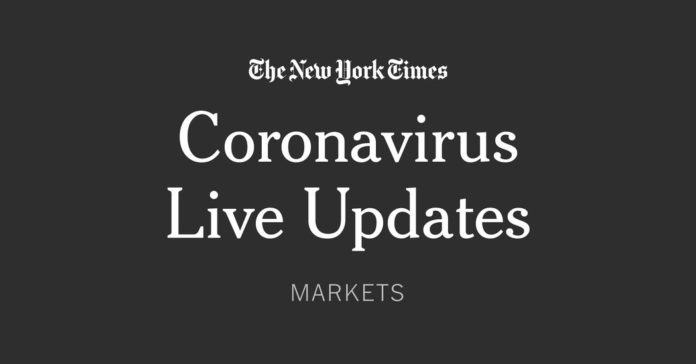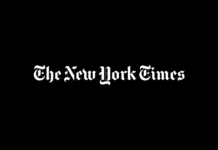Stocks begin the week mixed as investors weigh progress.
Global stock markets seemed uncertain which way to go on Monday, as news of the coronavirus outbreak’s relentless spread overcame signs of progress in some of the hardest-hit countries.
European markets were mixed after a largely muted trading day in Asia, despite a big rally in the United States on Friday. Futures markets were predicting Wall Street would slump when it opens.
The United States appeared to make progress in stabilizing its response. Lawmakers said they were nearing a deal for a new support package for small businesses, and President Trump said the authorities would step up testing. But protests in some states against the lockdowns underscored the economic damage that many households are suffering, in the United States and around the world.
Underscoring the unease, prices for U.S. Treasury bonds rose, suggesting investors were putting their money in safer havens. Oil prices whipsawed, as futures contracts expired at a time of weakening demand for oil.
In other markets, Hong Kong’s Hang Seng index ended the day 0.2 percent lower. In mainland China, where the authorities on Monday extended interest rate cuts to more parts of the economy, the Shanghai Composite index gained 0.5 percent.
In South Korea, the Kospi index fell 0.8 percent. In Australia, the S&P/ASX 200 index was down nearly 2.5 percent.
Even before the coronavirus outbreak, Amazon seemed omnipresent in American life, with half of U.S. households equipped with a Prime shipping and shopping account. Now Amazon is aggressively moving to capitalize on a newly captive market of millions of families unable or unwilling to shop normally.
While Amazon might be poised to dominate, resistance to it is beginning to coalesce. Labor organizations, immigrant groups and antimonopoly activists are working together for the first time in the hopes of restraining the company, which they see as using its power in ways that hurt employees and weaken society.
“If you relentlessly squeeze workers and suppliers, if you undermine every community’s local businesses, if you capture all of this surplus under the guise of efficiency and channel those gains to a small number of people, you end up with a system that is very vulnerable,” said Stacy Mitchell, co-director of the Institute for Local Self-Reliance and one of the leaders of the opposition.
The immediate battleground is the hundreds of thousands of workers in the warehouses, who are being asked to step up even as they are fearful of the health risks. A handful of workers are publicly protesting, something Amazon has never experienced before. The company says it is “working around the clock to get necessary supplies delivered directly to the doorsteps of people who need them” but it is also firing employees who are speaking out.
“Amazon has never been more powerful, but the consequences of its power have never been more visible,” Ms. Mitchell said. “It’s laid bare.”
Shake Shack, the fast-food chain, said on Sunday it was returning a $10 million loan from a federal program to help small businesses, following criticism that the stimulus program had favored large chains.
The $349 billion stimulus effort, which was distributed on a first-come, first-serve basis, was exhausted in just two weeks, with many loans favoring larger companies that were better able to navigate the application process.
The Paycheck Protection Program loans from the Small Business Administration will be forgiven for companies that do not lay off staff or that rehire them by June 30.
Shake Shack, with 189 outlets and nearly 8,000 employees in the United States, said it had secured the additional capital it needed through an equity transaction on Friday.
“We’re thankful for that, and we’ve decided to immediately return the entire $10 million P.P.P. loan we received last week to the S.B.A. so that those restaurants who need it most can get it,” the company said in a statement from Danny Meyer, the chairman of Shake Shack, and Randy Garutti, its chief executive.
The company said the loan program should be fully funded in order to not pit restaurants against one another. It called for scrapping the June forgiveness date in favor of staggered deadlines to reflect how the epidemic has hit different parts of the country at different times.
Consumers ask: Who ought to give me my money back?
Millions of people are wondering about refunds from airlines, concert venues and learning institutions. For the 22 million people who have filed for unemployment benefits, it is probably a simple matter: You take absolutely everything back that you possibly can. Ditto for those who face a large imminent decline in income.
But for consumers who are not yet desperate, it quickly gets complicated.
Some companies that already have your money are not very sympathetic. Take airlines: Some of the large carriers are of strategic importance to the economy, and this week they received their bailout. Yet even as they knew that they would almost certainly get their hands on our tax money, many held customers’ money hostage.
Ticketmaster put itself back in consumers’ cross hairs by making it look like they could get their money back only if shows were canceled instead of postponed. The company now says that it was all a big misunderstanding and that most people can get their money in a month or two.
Vrbo, which relies equally on the hosts who make properties available and the guests who rent them, split things down the middle, asking guests to accept as little as 50 percent back from hosts, if they could not find alternate dates.
Every refund request means weighing your household’s economic uncertainty against the perhaps equally precarious status of any given person or place that has your money but can’t deliver on all its promises. There is no rule book for these decisions.
The British government announced on Monday a $1.55 billion bailout package for the country’s start-ups, in an effort to help keep afloat young, often-unprofitable tech companies that have been hit by the economic fallout of the coronavirus.
Tech start-ups are inherently high-risk businesses and fail more often than not, but the package, worth 1.25 billion pounds ($1.55 billion), shows the government is concerned about losing young companies that could eventually grow to become larger parts of the economy.
European leaders have long viewed the inability to build large tech companies, as the United States and China have, as an existential threat. In recent weeks, France and Germany have taken similar steps to support start-ups that are struggling as a result of the virus.
Britain said £500 million would be available through the “Future Fund” to invest in high-growth start-ups if the companies can find matching funds. The money would be available as loans that could convert to equity stakes in the company. An additional £750 million would be available to smaller businesses focused on research and development, according to the Treasury Department.
Most Americans agree on the economic outlook: It’s bleak.
The coronavirus pandemic has united Americans of different races and income levels in deep pessimism about the economy, in contrast to the widely divergent views that prevailed before the crisis.
Highly paid or less so, black or white, investors in the stock market or not, Americans largely expect a poor or mixed performance from the economy in the coming year and prolonged damage over the next five years, according to a poll for The New York Times by the online research firm SurveyMonkey.
Those groups also roundly support the stringent limits on economic activity that state and local officials have imposed to slow the spread of the virus and minimize its death toll.
Many who have lost low-income jobs doubt that they will regain employment anytime soon. But those with high incomes also expect economic troubles to persist, even though they are far less likely to have lost jobs or hours, or to be worried about losing them.
One group remains a relative holdout in expressing faith that the economy will experience continuous good times over the next five years and that their own families will be better off a year from now: conservative Republicans. They are also far more likely to oppose the restrictions on activity that public officials have put in place, saying they have gone too far.
Those divides hint at what could be an important chasm as President Trump continues to pressure local officials to get back to business more quickly, with the presidential election approaching in the fall.
Reporting was contributed by Carlos Tejada, Austin Ramzy, Adam Satariano, Ron Lieber, Ben Casselman, Jim Tankersley and Kevin Granville.
Source : Nytimes











